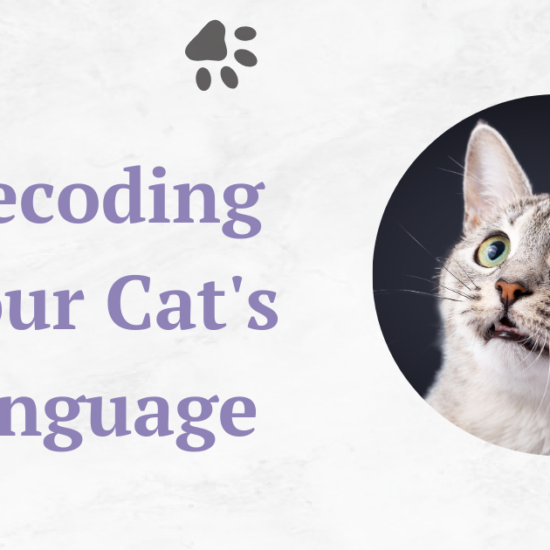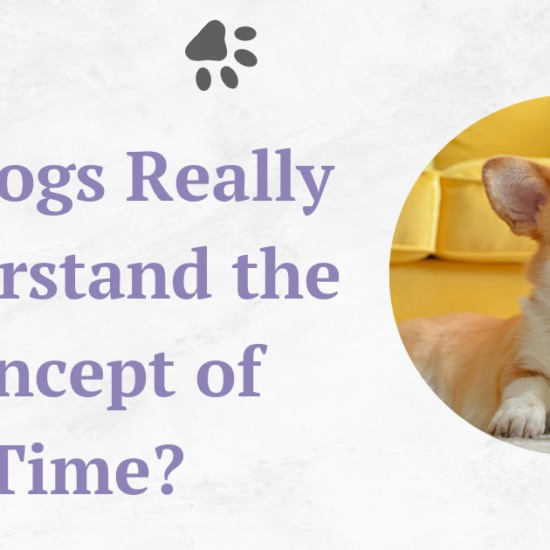Dogs, sometimes known as “man’s best friend,” come in an amazing variety of shapes, sizes, and personalities. When it comes to intelligence, though, not all dogs are made equal. Their intelligence varies greatly between breeds, with some dogs displaying exceptional problem-solving abilities and an incredible ability to absorb and understand complex orders.
Table of Contents
Introduction
We dig into the interesting subject of dog intelligence in this comprehensive article to analyze the most intelligent dog breeds. What precisely is intelligence in a dog, and which breeds routinely top the rankings of the smartest dog breeds in the world due to their mental prowess? We’ll also talk about how dogs can show intelligence and the factors that influence their cognitive abilities.
Understanding Canine Intelligence

Understanding the fundamentals of canine intelligence is crucial to comprehending the great diversity of our four-legged companions’ mental skills. While dogs are frequently praised for their devotion, playfulness, and affection, their cognitive capacities differ greatly between breeds and people. Let us explore the intelligence based characteristics that make the smartest dog in the world the leader of their lineage in terms of their cognitive ability.
Canine intelligence is divided into three major areas, each of which sheds light on various aspects of a dog’s mental prowess:
- Innate Intelligence
The ability of a dog to execute tasks for which it was bred is referred to as instinctive intelligence. This intelligence stems from the breed’s heritage and purpose. Herding breeds, such as the Border Collie, are renowned for their exceptional herding abilities. These canines are skilled at controlling and directing animals, demonstrating a thorough awareness of their position in a farming context. Hunting breeds, on the other hand, like the Bloodhound, excel at tracking scents. Their olfactory skills are nothing short of remarkable, allowing them to follow even the weakest smell trails with zeal. This inherent intelligence represents the breed’s genetic origin and is frequently used to distinguish them as a distinct group.
- Intelligent Adaptation
Adaptive intelligence is the ability of a dog to adjust to new surroundings, solve issues, and learn new commands. Dogs with strong adaptive intelligence absorb knowledge and respond to different obstacles with agility. These are the canines who seem to be able to open doors, comprehend the complexities of complex commands, and adapt to a variety of surroundings. Adaptive intelligence is not breed-specific; it is a reflection of a dog’s particular capacity to engage with its surroundings and adjust to the demands of daily living.
- Working/Obedience Intelligence

Working intelligence, often known as obedience intelligence, assesses a dog’s ability to consistently obey instructions and directions. Dogs with high working intelligence are frequently easier to train and more ready to obey. This intelligence is especially important in positions such as service dogs, therapy animals, and police canines. German Shepherds, for example, have great working intelligence and are frequently selected for a variety of hard professions due to their quick response to directions and dependability in following instructions.
It is critical to understand that canine intelligence is not a one-size-fits-all idea. While breed predispositions are important, a dog’s unique temperament, upbringing, training, and socialization are also important variables in their cognitive development. Even within a single breed, there is a range of intelligence, with each dog having their own way of displaying and utilizing their mental abilities.
Dog intelligence is as varied as the breeds themselves, and it is this diversity that makes them such fascinating and endearing companions. Understanding the complexities of canine intellect is the first step toward cultivating and appreciating the unique link we share with our canine companions.
Factors Influencing Canine Intelligence
A variety of elements influence our canine friends’ intelligence, each of which contributes to the distinctive cognitive profile of each particular dog. Understanding these variables is critical to unlocking the secrets of canine intelligence. Here’s a detailed look at the factors that influence a dog’s intelligence:
- Breed
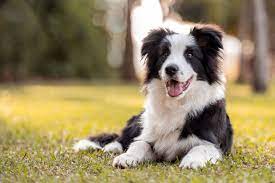
The underlying building blocks of canine intellect are genetics. Various breeds have been selectively cultivated for distinct features throughout generations, and these traits frequently extend to cognitive ability. For example, the Border Collie’s exceptional herding abilities are the consequence of generations of breeding for field work. Bloodhounds, with their exceptional smell senses, have evolved for tracking and hunting. As a result, the breed of a dog provides a good indication of their prospective cognitive capacity. However, it’s important to understand that there is significant individual variation within breeds and that breed is not the primary determinant of intelligence.
- Education

Proper training is essential to developing a dog’s intellect. Dogs, like humans, learn and adapt through experience and exposure to a variety of settings. Training that is well-structured and based on positive reinforcement can have a substantial impact on a dog’s cognitive development. A well-trained dog is viewed as more clever because it can respond to a variety of commands, solve problems more effectively, and adapt to different settings.
- Interaction

A dog’s mental development requires early exposure to a variety of situations, people, and other dogs. Socialization helps children develop into well-rounded individuals who are at ease and confident in a variety of situations. Dogs who receive little socialization may struggle with new experiences and appear less intelligent as they navigate unexpected situations.
- Nutrition and Wellness

The diet and overall health of a dog have a significant impact on their cognitive ability. A healthy diet is essential for brain growth and function. A well-balanced diet rich in critical nutrients promotes normal brain development, especially during puppyhood. Furthermore, health issues or illnesses can impair a dog’s mental acuity, making it critical to address health concerns as soon as possible.
- Age
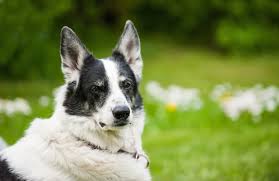
Dogs, like people, evolve cognitively as they mature. Puppies are still in their infancy, and their intelligence, while promising, is not as polished as that of grown dogs. Dogs get wiser and more adept at problem-solving over time. As they gain experience, they learn to traverse the complexity of the human and canine worlds, which improves their general cognitive ability.
- Individual Difference
Every dog, like every human, has a distinct personality and cognitive style. Even among the same breed, there can be significant differences in intelligence. These variations result from a combination of genetic variables and personal experiences. Two dogs of the same breed might have varying levels of innate, adaptive, and working intelligence, emphasizing the need to recognize and appreciate each dog’s uniqueness.
10 Most Intelligent Dog Breeds
Let’s look at the ten smartest dog breeds in the world and rate them based on their general cognitive abilities.
- Border Collie

Border Collies have long been known as one of the most intelligent dog breeds. These dogs are nothing short of miracles, renowned for their unrivaled problem-solving abilities and unfailing obedience. Border Collies, which were originally intended to herd sheep, excel at learning complex orders, making them excellent in a variety of canine sports. Their high activity levels and work ethic make them a formidable force in obedience, agility, and sheepdog contests.
- Poodle
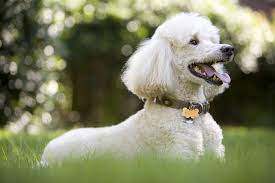
Poodles are known for their versatility and trainability and come in standard, miniature, and toy sizes. Their intellect and enthusiasm to learn help them excel at obedience training and position them among the smartest dog breeds in the world. Poodles are frequently seen navigating agility courses with grace and flair. They are affectionate and loyal friends with an instinctive capacity to understand their owners’ needs, so their adaptability goes beyond the show ring.
- German Shepherd

German Shepherds are extremely intelligent and adaptable. They perform admirably in a variety of professions, including police work, search and rescue missions, and assistance dogs. Because of their devotion and quick learning ability, they are a popular choice for these difficult duties. Their protective character and unshakable adherence to complex demands lead to their extensive employment in tasks requiring intelligence, bravery, and dependability.
- Golden Retriever

Golden retrievers have a lovely combination of intelligence and friendliness. They are wonderful family pets due to their high trainability and desire to please. Being one of the most intelligent dog breeds, these dogs are eager to pick up new skills and excel at obedience training. Their ability to solve problems, combined with their gentle and loving character, has earned them a reputation as one of the most popular breeds.
- Doberman Pinscher
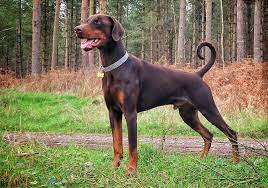
Dobermans are recognized for their vigilance and strong working intelligence. Being one of the smartest dogs in the world, they learn quickly and are often used as security dogs or in search and rescue operations. Their acute senses and ability to respond quickly to commands make them a formidable breed in positions that require both physical and mental strength.
- Shetland Sheepdog
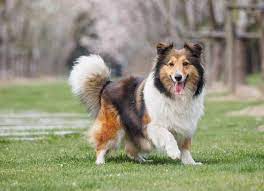
Shetland Sheepdogs, despite their small size, have an innate aptitude to obey directions and complete duties. These herding dogs are well-known for their agility and exceptional problem-solving abilities. Their intellect and agility set them apart in canine sports, and they are also adored as faithful friends.
- Labrador Retriever

Labrador Retrievers are not only one of the most popular but also one of the smartest dog breeds in the world. They are extremely flexible and thrive in a multitude of activities, including search and rescue missions and working as guide dogs for the blind. Their ability to solve problems, combined with their loving and compassionate temperament, makes them well-rounded canines who flourish in a variety of environments.
- Papillon

A toy breed, the Papillon, routinely exhibits excellent adaptability. As one of the most intelligent dogs in the world, they are quick to pick up new tricks and thrive at agility events. Their agility, along with their smart intellect, enables them to navigate complex courses with grace and precision.
- Rottweiler

Rottweilers are a one-of-a-kind combination of intelligence and strength. They are frequently used as working dogs, such as in police work and search and rescue missions. Their vigilance, along with their ability to execute complex directions, puts them among the most intelligent dogs in the world and also makes them strong assets for demanding tasks that necessitate both muscle and intelligence.
- Aussie Cattle Dog

Australian Cattle Dogs excel at herding cattle, demonstrating excellent instinctive intelligence. They are well-known for their ability to solve problems quickly, making them important assets on farms and ranches. Their quick thinking and agility allow them to manage cattle effectively and efficiently.
While these breeds often rank well among the most intelligent dog breeds due to their brilliant intelligence, individual dogs within these breeds can differ. A dog’s upbringing, training, and socialization all have an impact on how intelligent they are.
Canine Intelligence Test
Canine intelligence is a multidimensional subject, and specialists have designed a variety of tests to assess and rank the cognitive capacities of various canine breeds. While these tests are not completely conclusive, they do provide valuable insight into a dog’s ability to learn, solve issues, and adapt to their surroundings. Here’s an in-depth look at some of the most well-known canine intelligence tests and how they can provide insight about the smartest dog breeds in the world:
- Stanley Coren’s Dog Intelligence

Dr. Stanley Coren, a well-known expert in dog intelligence, conducted comprehensive research in which he classified 138 breeds based on obedience and working intelligence. The goal of this extensive study was to provide an objective framework for understanding canine intelligence. The breeds were divided into three categories based on their working intelligence: exceptional, above-average, and average. According to this test, the most intelligent dogs in the world were Border Collies, Poodles, and German Shepherds, who demonstrated an extraordinary capacity to learn and obey directions. This exam provides a great glimpse of how various breeds respond to training, highlighting the importance of obedience and working intelligence.
- Canine Good Citizen Examination

The Canine Good Citizen (CGC) Test assesses a dog’s obedience and ability to follow simple directions and behave well in a variety of scenarios. It includes duties like walking on a leash without pulling, responding to commands like sit, remain, and recall, and displaying appropriate behavior around strangers and other dogs. The CGC exam is frequently used to determine whether a dog is suitable for therapy work or as a service dog. This exam measures a dog’s working intelligence and appropriateness for specific roles by measuring their obedience and ability to maintain composure in real-life settings.
Note: There might be affiliate links mentioned here. We may receive a commission if you purchase a product through an affiliate link. There is no additional charge for you. Please do your own research before making any online purchases.
- Tug-of-War Exercise

The tug-of-war test is a simple yet effective method of assessing a dog’s problem-solving aptitude. It entails concealing a reward or toy beneath a heavy object and daring the dog to retrieve it using their wits and muscles. This test demonstrates a dog’s adaptive intelligence because they must design a way to obtain the hidden reward. The time and manner used by a dog to fetch the treat reveal information about their problem-solving abilities.
- Puzzle Toy Evaluation
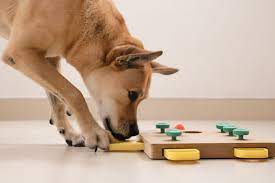
Puzzle toys are intended to stimulate a dog’s cognitive talents while also entertaining them through the use of a hidden reward. To gain access to treats or kibble, these toys frequently require the dog to manipulate parts or solve puzzles. The amount of time it takes a dog to find out how to recover a hidden treat can indicate their adaptive intelligence. Dogs who quickly comprehend the concept and complete the puzzle display greater cognitive flexibility.
- Social Intelligence Assessment
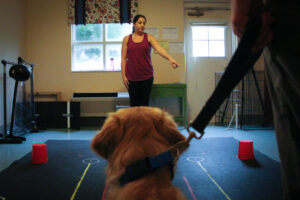
This test assesses a dog’s capacity to recognize and respond to human emotions and cues, indicating social intelligence. Dogs with a high level of social intelligence are more in tune with their masters, demonstrating empathy and a response to human emotions. This feature of intelligence is critical for the human-canine bond since it improves communication and comprehension between dogs and their human counterparts.
While these tests might provide useful information about a dog’s cognitive ability, it’s important to realize that intelligence is a multidimensional term. Dogs’ intellect may excel in some areas while varying in others. Additionally, a combination of genetics and environmental factors like upbringing, training, and socializing can affect intelligence. The genuine core of canine intelligence extends beyond these tests, embracing a wide range of mental talents and the distinguishing characteristics that make dogs such beloved and clever companions in human lives.
Canine Intelligence Development
Developing your dog’s intelligence is not only a joyful task, but it is also a critical component of their general well-being. There are several ways you may use to help your animal pet develop and improve their cognitive abilities, regardless of breed or age. Here are some helpful hints for increasing your dog’s intelligence:
- Training

Training is the foundation for developing your dog’s intelligence. Consistent, positive reinforcement-based instruction can improve their compliance and problem-solving abilities dramatically. Create a solid foundation by teaching basic commands like sit, remain, and come. Introduce more sophisticated commands and tricks as your dog grows. Learning not only boosts their cognitive powers, but it also strengthens your bond with your dog.
- Interactive Toys

Interactive toys and activities are great for stimulating your dog’s brains. Puzzle toys, treat dispensers, and interactive games like hide-and-seek challenge their problem-solving abilities. These activities stimulate your dog’s mind, avoid boredom, and keep him mentally engaged. Working for rewards is a task that dogs like, and these toys teach them to think and strategize.
- Regular Physical Activity
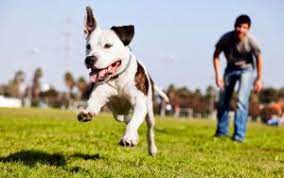
Physical activity not only benefits your dog’s physical health but also stimulates their brains. Activities such as retrieve, agility training, and obedience training aid in their cognitive development. Daily exercise helps to burn off surplus energy and improves brain clarity. A tired dog is frequently a content and well-behaved dog; thus, exercise is an important part of developing their intellect.
- Interaction

Early socialization is critical for assisting your dog in adapting to new people, animals, and settings. Experiment with your dog in a variety of settings, from busy city streets to calm parks, from playdates with other dogs to interactions with children and adults. Not only does socialization improve their ability to adapt to new settings, but it also develops social intelligence. It improves your dog’s understanding and response to human and canine stimuli.
- Learn New Skills
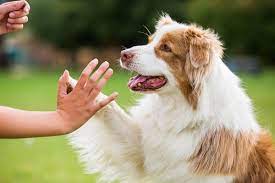
Dogs thrive on cerebral stimulation. Introducing new commands and tricks on a regular basis keeps their minds fresh and engaged. Learning new tricks keeps their routine exciting and varied, reducing brain stagnation. Rolling over, weaving between your legs, or even feigning death are all jobs you can give your dog. This not only improves their cognitive capacity but also increases their self-esteem.
- Using Positive Rewards

Positive reward training methods are extremely successful at developing your dog’s intelligence. Rewarding your dog for desired behavior pushes them to solve problems. Offer food, praise, and affection when they successfully answer a demand or demonstrate good behavior. This positive reinforcement strengthens their understanding of what makes you happy and drives them to learn faster and behave better.
FAQs
What exactly is canine intelligence, and why is it significant?
The ability of a dog to learn, solve problems, and adapt to new settings is referred to as canine intelligence. It is critical because it determines a dog’s capacity to obey directions, respond to training, and adapt to diverse settings, all of which affect their behavior and well-being.
Is it possible for all dog breeds to be equally intelligent?
No, because of their breeding history and intended function, canine intelligence varies throughout breeds. Some breeds are genetically predisposed to excel in specific areas, such as herding or hunting, reflecting their instinctive intelligence.
Can individual training and socializing improve the intelligence of a less intelligent dog?
While training and socializing can improve a dog’s behavior and problem-solving abilities, they may have little effect on a dog’s intrinsic intellect. These elements, however, are critical to enhancing a dog’s cognitive capacity.
What impact does genetics have on canine intelligence?
The genetic makeup of a dog has a significant impact on its IQ. Various breeds have been selectively selected for specific characteristics, like cognitive ability. This genetic basis has an impact on a dog’s cognitive ability.
How can I tell if my dog is intelligent?
Various tests and observations can be used to assess your dog’s intelligence. Simple tests, such as the tug-of-war test or the puzzle test, can provide information about their problem-solving abilities. Observing their reactions to training and commands can also reveal their working intelligence.
Are there any particular activities or exercises that can help a dog’s intelligence?
Yes, playing with interactive toys, exercising regularly, and teaching your dog new tricks can help stimulate their cognitive abilities. These activities keep their minds challenged and mentally engaged.
Can positive reinforcement training assist all dogs, regardless of breed?
Yes, all dogs, regardless of breed, can benefit from positive reinforcement training. These strategies are particularly effective in promoting obedience and problem-solving skills while enhancing the human-canine bond.
Can older dogs get smarter with age?
While puppies are in the early phases of growth, older dogs tend to become wiser and more competent at problem-solving with age. Their acquired experiences contribute to their overall cognitive capacity.
Is it possible to develop and enhance a dog’s intelligence at any age?
Yes, you can cultivate a dog’s intelligence at any age through training, interesting toys, regular exercise, socialization, and teaching new tricks. Dogs of all ages can benefit from mental stimulation and enrichment.
What should the major goal of developing canine intelligence be?
The ultimate purpose of developing canine intelligence is to have a happy, healthy, and well-adjusted companion, not merely the smartest dog. While intelligence is crucial, it should be used in conjunction with other factors to establish a fulfilling and harmonious relationship between you and your dog.
Conclusion
Canine intelligence is an intriguing characteristic of our four-legged friends. While some breeds typically indicate high cognitive levels, individual dogs within any breed can differ greatly. Proper training, socialization, and environmental enrichment all play important roles in the cognitive development of a dog.
Every dog, whether a Border Collie, a Poodle, a Golden Retriever, or another breed, has its own method of demonstrating intellect. It is our obligation as dog owners to provide them with the necessary tools, training, and experiences to help them reach their greatest potential.
In the end, having the smartest dog isn’t as important as having a happy, healthy, and well-adjusted pet who brings joy and friendship into our lives. After all, intellect is simply one of the many characteristics that distinguish dogs as our most devoted and cherished companions.






